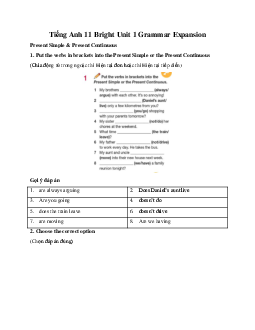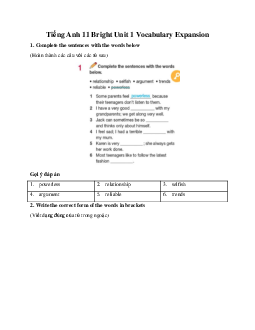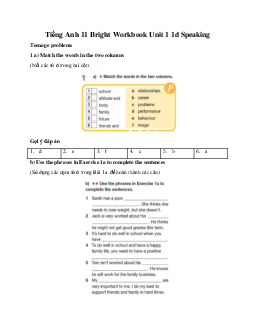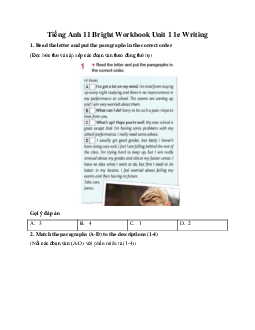




Preview text:
Bài tập Tiếng Anh 11 Bright Unit 1
Choose the word that has underlined part pronounced differently from the others 1. A. chat B. chef C. chore D. lunch 2. A. chance B. kitchen C. technology D. children 3. A. resolution B. information C. graduation D. activity
Choose the correct answer A, B, C or D to indicate the best option for each of the questions
1. The brothers …………… time with their friends this Saturday because they want to visit their aunt. A. spend B. are spending C. don’t spend D. aren’t spending
2. Dad needs to any …………… working on his project before he does the housework. A. on B. out C. off D. over
3. Teens usually don’t understand why their grandparents are …………… technology
and don’t even want to touch any high-tech gadget. A. afraid of C. excited about B. interested in D. keen on
4. Lots of children say that their parents usually …………… them about chores and studying. A. advise B. nag C. argue D. punish
5. Alana isn’t worried about her school …………… because she’s got many high marks A. performance B. attitude C. behaviour D. image
6. Bob: “You look really annoyed. What’s wrong?”
Ivan: “…………………………”
A. My dad often gives me enough pocket money.
B. My mum hardly ever nags about my studies
C. My school performance is quite good
D. My grandparents don’t like my close friends at all
Complete the sentence with the correct forms of the words in brackets
1. If you have schoolwork problems, talk to your teacher. He’s very ……………. (understand)
2. When teenagers get older, they became more ……………. from their parents. (depend)
3. William doesn’t get on well with his sister. There are often lots of ……………. between them. (argue)
Read a blog about teenage problems. Choose the letter A, B, C or D to indicate the
best option for each of the blanks Hi everyone!
I’m 16 years old. I fully understand that the teenage years are not always easy there days
because we must deal with lots of problems. The first problem should be our studies. We
mostly worry about our (1) ……….. and how to improve our grades. Moreover, we’re
sometimes under huge stress thinking about our (2) ……….., trying to find out what jobs
we can do. The second problem we must face us the generation gap between teenagers
and parents. It’s common to (3) ……….. our parents over chores. Besides, some parents
usually nag their teenage children about their attitude and behaviour. It’s very sad that
some teens don’t get on well with their family and their parents feel powerless to advise
their children. The last problem is our biological changes. During adolescence, lots of
teens are moody and even become (4) ………… Our bodies can develop quickly and
sometime in an annoying way, which can reduce our confidence and affect our
behaviour. For example, some teenagers have strange manners and (5) ……….. at home.
Are you experiencing any of these teen problems? Then, you are not alone. I’d love to
hear about your worries and give as much help as I can. 1. A. friendship B. school C. family problems D. attitude performance 2. A. hobbies B. pocket money C. future career D. modern technology 3. A. look after B. help with C. carry out D. argue with 4. A. difficult B. easy-going C. old-fashioned D. strict 5. A. feel happy B. do more chores C. break rules D. earn money
Read a text about saying sorry. Decide if each of the statements is T (TRUE), F
(False) or DS (DOESN’T SAY)
We all argue with our friends and family. Sometimes we say bad things loudly or do
things that can hurt the others’ feelings. It’s great when all that doesn’t happen, but when
it does, we need to do something about it. It’s a very simple something, but it can also
feel like the most difficult thing in the world. That something is the act of saying sorry
(and it’s something the English do a lot - about eight times a day!).
Experts report that saying sorry is good for our relationships and our mental health. It
reduces our stress levels by stopping us from getting worried too much. It helps us sleep
at night without waking up and thinking about our problems.
In most cases, saying sorry makes a bad situation better. It’s important that we say
exactly what we did wrong. By doing this, the listeners understand that we know what
hurts them but want to put things right, and it repairs relationship. Sometimes we make
ourselves say sorry although deep inside us, we feel otherwise. This often doesn’t work
well because it’s not an honest “sorry”.
Saying sorry might not make everything right, but it is a step in the right direction. The
other person may not accept what we have to say (and that’s okay, too), but that shouldn’t
stop us from doing it. It can be difficult, but if we say sorry often, and mean it, then it
becomes a habit. Unlike arguing all the time or not talking to your friends when they
upset you, saying sorry is truly a great habit to have.
1. The people who are close to us might be hurt by our words or actions.
2. Saying sorry can help people get physically fitter.
3. We should mention our mistake when saying sorry.
4. Honest people find it easy to say sorry.
5. Saying sorry frequently could become a bad habit.
Complete the sentences with the given beginnings in such a way that their meanings stay unchanged.
1. According to the schedule, Elisa’s performance at the music festival is at 8 p.m today.
Elisa ________________________________________________________
2. My school performance is a huge worry for me.
I’m __________________________________________________________
3. My mum’s cheese has a nice smell
My mum’s cheese ______________________________________________
4. Lucy’s little sister is being very impolite.
Lucy’s little sister _______________________________________________
5. My sisters are eating beefsteak for lunch.
My sisters _____________________________________________________ -The end-
Đáp án bài tập Tiếng Anh 11 Bright Unit 1
Choose the word that has underlined part pronounced differently from the others 1. B 2. C 3. D
Choose the correct answer A, B, C or D to indicate the best option for each of the questions 1. D 2. A 3. A 4. B 5. A 6. D
Complete the sentence with the correct forms of the words in brackets
1. If you have schoolwork problems, talk to your teacher. He’s very
……understanding………. (understand)
2. When teenagers get older, they became more ……independent………. from their parents. (depend)
3. William doesn’t get on well with his sister. There are often lots of
……arguments………. between them. (argue)
Read a blog about teenage problems. Choose the correct answer A, B, C or D to complete the sentence. 1. B 2. C 3. D 4. A 5. C
Read a text about saying sorry. Decide if each of the statements is T (TRUE), F
(False) or DS (DOESN’T SAY) 1. T 2. DS 3. T 4. DS 5. F
Complete the sentences with the given beginnings in such a way that their meanings stay unchanged.
1. Elisa is performing at the music festival at 8 p.m today.
2. I’m really/ so worried about my school performance.
3. My mum’s cheese smells nice.
4. Lucy’s little sister is behaving very impolitely.
5. My sisters are having beefsteak for lunch.



